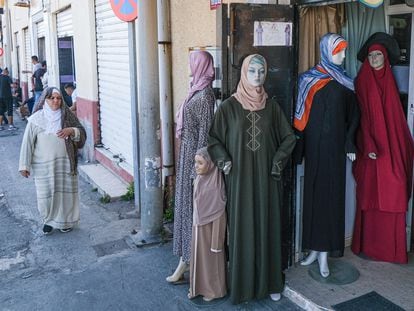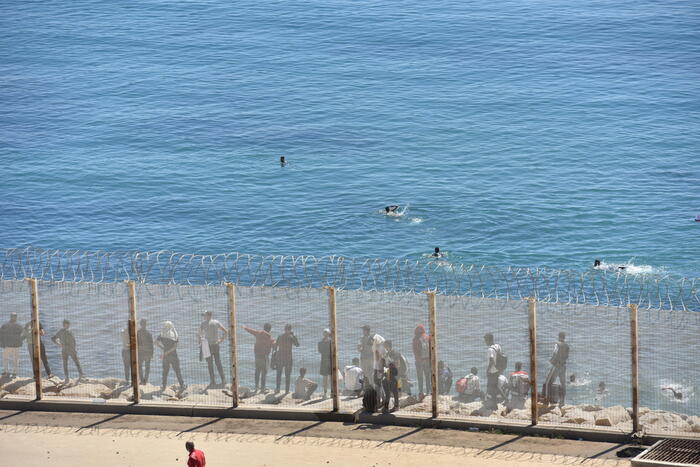A woman walks through the streets of Ceuta last Wednesday, one day after the reopening of the border. Alejandro Ruesga
Toría has been touring around the Spanish Consulate in Nador, a province bordering Melilla, all Thursday morning, together with a group of friends and fellow sufferers.
She asks and cross-questions what documents she needs for the visa that will allow her to leave Morocco as of May 31 as a cross-border worker.
In response, she receives a hodgepodge of mentions of papers that opens up new questions.
Meanwhile, in Ceuta, the Government Delegation has coordinated with the Tetouan consulate to manage temporary visas that will allow access to the city and arrange their papers for more than 400 employees with renewed work permits who stayed in Morocco.
In Melilla, the confusion is total.
There are only eight days left before cross-border passengers are allowed to cross,
Madrid and Rabat are still negotiating a "gradual and orderly" normalization of land crossings in Ceuta and Melilla after 26 months of closure.
The borders, vital for the economy of the two cities, were kept sealed, first, for health reasons and, later, as a measure of pressure from Morocco in the diplomatic crisis that has strained relations between the two countries to the maximum in the last year. .
Now, after the Government's support for the Rabat proposal for the future of Western Sahara (providing it with autonomy but under Moroccan sovereignty and without a self-determination referendum), an uncertain future is opening up for the two cities that Morocco has always claimed as its own.
More information
The fear of the uncontrollable Moroccan neighbor in Ceuta and Melilla
The situation has changed a lot since 2020 and the ease of transit between the two countries is no longer such.
Now that the rules are being defined to allow the passage of cross-border workers, everything indicates that many things are going to change.
At the moment, cross-border women whose work permits are no longer in force need a visa to return.
They ask for information and planning.
On Friday, the Consulate in Nador was once again filled with dozens of workers who wanted to get an appointment and find out about the visa that is now required of them.
No one knows how to process it or how it will work.
According to the head of the Immigration Office of the Government Delegation, Elena Nieto, this visa is only guaranteed to some 80 listed people who have been working in Melilla since 2020. Across the border, in Morocco, there are almost 2,000 workers with their work permits expired, for whom there is still no solution.
Nieto affirms that they are waiting for “orders from Madrid”.
The majority are domestic workers, some with 20 years of Social Security contributions and now they have neither unemployment, nor severance pay, nor work.
"There are many whom the bosses are not going to hire again," she snaps at a meeting of the Moroccan Union of Workers Karima Said, spokesperson for the union.
"We need a solution for all, not a visa, we need to cross freely, as before, to be able to renew the work permit and seek employment."
The future of customs
Beyond the workers, the passage of merchandise is up in the air, because after the end of smuggling those borders will no longer be the same.
The end of the so-called atypical trade imposed by Morocco was interpreted in Spain as another strategy of economic suffocation for the two cities, but now the perspective has changed.
"No one wants that unfortunate image anymore," says a Spanish government source.
“There has to be a before and after with this opening.
It is not a pre-pandemic return to normality, it must be a 21st-century frontier,” she adds.
The El Tarajal polygon, in Ceuta, has been practically deserted since 2019. Almost all the ships where clothes, shoes or technological gadgets were bought that passed to Morocco on the backs of hundreds of porters closed.
It was revived a year later, when a handful of those ships reopened to store hundreds of children who swam in from Morocco, but these days, the cries of seagulls are barely heard there.
In Melilla, cemeteries of vans have been created, previously used to unload merchandise in packages, and "patera cars" that put food.
Many stores have closed.
Some businessmen even went to the Peninsula to relaunch their businesses or export from there to Morocco through other ports.
Others, like Sabah Ahmed, who still has a warehouse in Ceuta,
They have turned it around: “I had already traveled a lot to Turkey and I brought trousseau products for the baby and the bride.
It is something that has worked very well, so when the border closed, I stayed with it.”
During these days the Moroccan authorities have not allowed the passage of a single box of chocolates, but the border of the future that Spain wants is to reopen the commercial customs of Melilla, closed by Morocco without prior notice in 2018, and create a new one in Ceuta .
After the joint statement made public after Pedro Sánchez's visit to Mohamed VI on April 7, government sources took it for granted that this would be done, but there are still more doubts than certainties.
Does Morocco agree? What benefits will it bring? When will it happen?
There are no forecasts of the traffic that a commercial customs office in Ceuta could have because it never existed, according to sources from the Tax Agency, but in 2017 (the last comparable full year) the commercial customs office in Melilla managed 18,900 tons of exports to Morocco worth almost 19 .2 million euros.
As a close reference, that same year, the Gibraltar commercial customs moved more than one million tons in exports worth 2,030 million euros.
A source familiar with the negotiations between the two countries explains that the Moroccan interlocutors have been open to collaborating, but adds a detail that is not accidental: the Moroccans naturally mention the Melilla customs office, but avoid mentioning the Ceuta customs office.
In Ceuta, however, they do not plan to stay out of the deal.
Its Minister of Economy and Finance, Kissy Chandiramani, maintains that a customs office would help recover losses from the pandemic and the closure of borders, which have reached 400 million euros.
In addition, she assures, it would encourage exporting and logistics companies to settle in the city.
Until a few years ago, Rabat was interested in goods entering through the border with Melilla.
"Thanks to the port of Melilla, Morocco has been able to provide goods and services to a part of the country that it could not supply because it lacked infrastructure," explains Jalid Said, spokesperson for Acsemel, an organization that brings together some of the most affected by the border closure.
Said's family, he assures, was one of the first in Melilla to have ships to store everything that arrived by ship to the autonomous city before the port of Beni Ensar was opened, where ferries now arrive from Malaga and Almería, and the Nador Med project began, in the image of the port of Tangier.
In addition to the economic boost, there are those who defend, in Madrid and in Ceuta and Melilla, that the opening of customs is also symbolic and that it would mean a tacit recognition of the Spanish sovereignty of Ceuta and Melilla.
It seems like an optimistic omen: the Melilla customs office dates back to 1867 and its operation until 2018 did not placate the proclamations of the Moroccan authorities who have always perceived the autonomous cities as "presidios occupied" by Spain.
Exclusive content for subscribers
read without limits
subscribe
I'm already a subscriber




/cloudfront-eu-central-1.images.arcpublishing.com/prisa/C4IYYIVRFGRNYFDXR36TFCCVAM.jpg)
/cloudfront-eu-central-1.images.arcpublishing.com/prisa/VS4RJNOL7ULGHTZDNQQRIWEYIA.jpg)


/cloudfront-eu-central-1.images.arcpublishing.com/prisa/FNKLLK5XKNWEKUJYBF4ZFC5S6U.jpg)